
Conflict Resolution in South Caucasus: Challenges to International Efforts
(Paperback)
Available Formats
Publishing Details
Conflict Resolution in South Caucasus: Challenges to International Efforts
By (Author) Esmira Jafarova
Bloomsbury Publishing PLC
Lexington Books
29th August 2016
United States
Classifications
Professional and Scholarly
Non Fiction
Political science and theory
Peace studies and conflict resolution
Nationalism and nationalist ideologies and movements
327.475
Physical Properties
Paperback
198
Width 152mm, Height 228mm, Spine 14mm
286g
Description
This book aims to highlight the efforts by the international community to facilitate solutions to the conflicts in the South Caucasus, and focuses particularly on the existing challenges to these efforts. The South Caucasus region has long been roiled by the lingering ethno-national conflictsNagorno-Karabakh conflict between Armenia and Azerbaijan, Abkhazia and South Ossetia conflicts within Georgiathat continue to disrupt security and stability in the entire region. Throughout different phases of the conflicts the international community has shown varying degrees of activism in conflict resolution. For clarity purposes, it should be emphasized that the notion of international community will be confined to the relevant organizations that have palpable share in the processthe UN, the OSCE, and the EUand the states that have the biggest impact on conflict resolution and the leverage on the conflicting partiesRussia, Turkey, and the United States.
Reviews
Plagued by long-standing ethnonational conflicts in the territories of Nagorno-Karabakh, Abkhazia, and South Ossetia, South Caucasus has seen little security and stability since Armenia and Georgia declared their independence in the aftermath of the dissolution of the Soviet Union in 1991. Jafarova focuses her research on this understudied region, and on the efforts of the international community to bring about a resolution to that conflict. The volumes seven brief chapters provide a summary of the conflict; discuss the input of the UN, the Organization for Security and Co-operation in Europe, and the EU, but also Russia, Turkey, and the US in conflict resolution; and highlight some of the misconceptions that have underpinned international engagement with the region. Jafarovas understanding of the complex local dynamics and efforts to situate the South Caucasus conflicts within existing theoretical insights make this volume a welcome addition to the literature. Summing Up: Recommended. Upper-division undergraduate, graduate, research, and professional collections. * CHOICE *
With an insider's understanding of complex local dynamics and an eye on shifting international political agendas, Esmira Jafarova skillfully analyzes the contributions and limitations of the international resolution mechanisms and outside powers that have operated in the conflicts of the South Caucasus. This book offers helpful guidance to both scholars and policymakers, exposing the flawed assumptions that often underpin the international community's engagement with the region. -- Alexander Cooley, Columbia University
Author Bio
Esmira Jafarova is visiting scholar at Columbia University's Harriman Institute and has previously held diplomatic positions at the Permanent Missions of Azerbaijan to the OSCE and to the United Nations.
